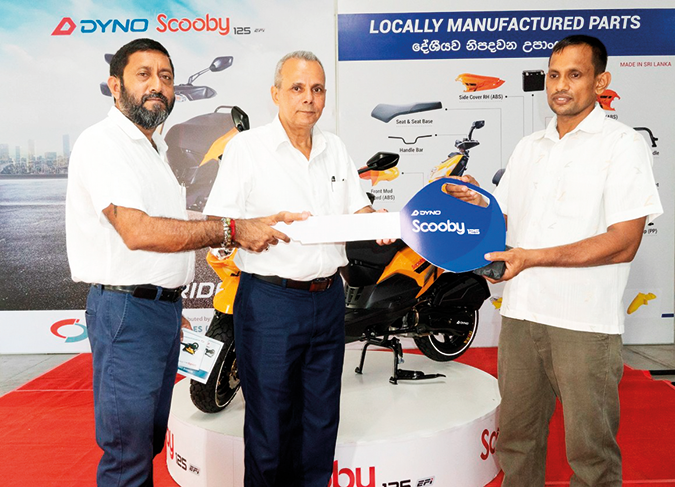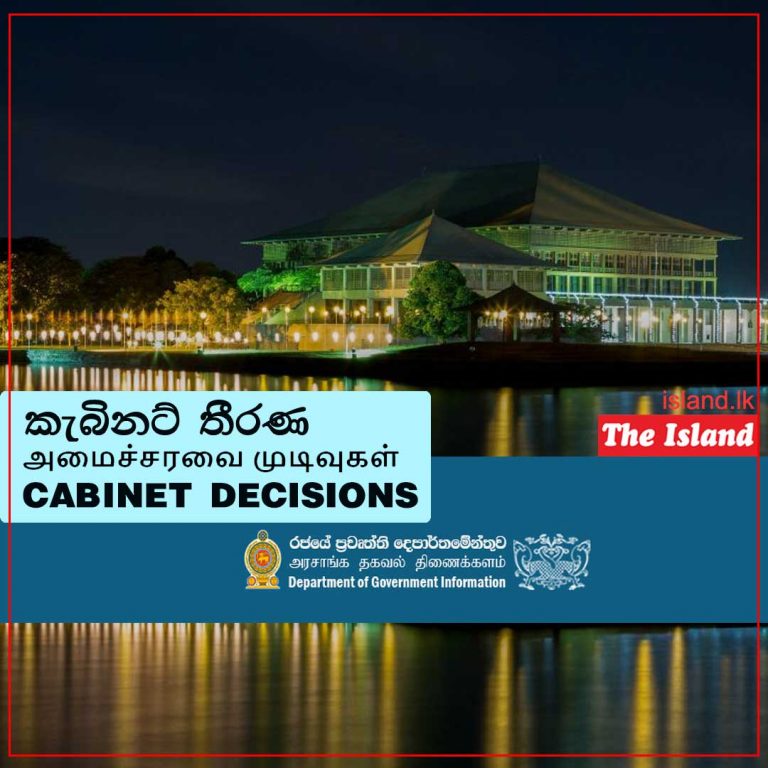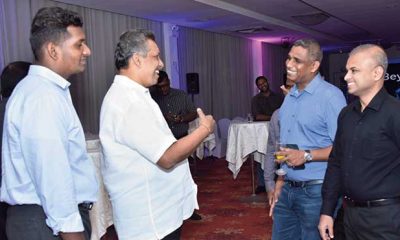Business
News Scooter with local value addition launched

The DYNO Scooby 125 EFi Scooter was recently launched by Inventive Automobiles (Private) Limited. DYNO Scooby 125 Scooters are assembled in Sri Lanka using 14 locally manufactured components under the new Standard Operation Procedures (SOP) imposed by the Ministry of Industries, a news release from the assemblers said last week.
Speaking at the launch, Mr. Lester Carron, Director of the Company said, “The DYNO Scooby 125 has key features such as, a high performance 125cc EFi Engine which provides an increased fuel efficiency, front Disc Brake with mechanical ABS for added safety, and a longer wheelbase for increased stability. The Scooter has both electric and kick starter, all of which makes it the ideal vehicle for the entire family. Other features are, Digital meter, more luggage space, higher ground clearance, backed by an attractive introductory price and most importantly an island-wide after sales network makes this the best buy.”
DYNO Scooby 125 is manufactured by Dyno Innovations (Private) Limited and Marketed & Distributed by Inventive Automobiles (Private) Limited. The Six Plastic components of the Scooter such as, Front Mud Guard, Rear Mud Guard, Rear Mud Flap, Two Side Covers and Seat Base are manufactured at the Company’s very own plastic injection moulding factory.
“In this process, we make adjustments to the designs to ensure that the product is improved to a high quality and durable finished product. Other components such as Handlebar, Side Stand, Main Stand, all Seat Brackets and Hinge, Mud Flap Bracket and Grab handle are produced by reputed Sri Lankan suppliers,” the release said.
For the first time in Sri Lanka, the complete Scooter Seat (seat base, hinge, brackets, seat cushion, rubber bumpers, beading and seat cover) is manufactured locally; these components are assembled to produce the perfect DYNO Scooter by skilled technicians, in the assembly facility at Makumbura, Pannipitiya. The vehicle is offered with two comprehensive Free Services as well as a Two-Year or 30,000km warranty.
The Company has plans to introduce many other Scooter models inclusive of electric scooters which are attractively designed with high performance and functionality which we hope to introduce to the market shortly. Carron went on to say that as a Sri Lankan company, their aim is to manufacture more than 60% of the vehicle locally. The opportunity to enter the market with a local value addition model is the first step to achieve their goal.
Business
Cabinet approves CECB as consultant for renovation of the Karainagar boat yard project

The Cabinet of Ministers has approved the proposal presented by the Minister of Fisheries, Aquatic and Marine Resources to seek the services of the Central Engineering Consultancy Bureau as a consultant for the renovation of the Karainagar boat yard project and allocate 40 million rupees from the Treasury for the expenditure to be borne by the Government of Sri Lanka.
[A memorandum of understanding was signed by the President during his official visit to India in December 2024. , to obtain a grant from the Government of India for the renovation of the Karainagar Boat Yard
According to the MOU, the responsibility of providing the technical consultancy service for the project and exempting the goods and equipment related to the grant from taxes has been assigned to the government of Sri Lanka.]
Business
‘Transformative infrastructure’ installed at Colombo West International Terminal

In a landmark move for Sri Lanka’s logistics landscape, EFL Project Logistics has completed a critical phase of deliveries for the Colombo West International Terminal (CWIT), a transformative infrastructure project poised to reshape the country’s role in global maritime trade.
CWIT—a collaboration between Adani Ports and SEZ Ltd (51%), John Keells Holdings and the Sri Lanka Ports Authority—is set to be the island’s first fully automated deep-water terminal. As it gears up for full commercial operations in 2025, the recent arrival of high-tech port handling equipment marks a key economic inflection point for Sri Lanka.
Speaking exclusively to The Island Financial Review on the impact, Mohamed Niyas, General Manager – Project Logistics at EFL, said, “The logistics we executed for CWIT are more than just cargo movements; they are catalysts for economic transformation. These deliveries—ranging from electric inter-terminal trucks to automated gantry cranes—are essential to positioning Sri Lanka as a sustainable, high-capacity transshipment hub.”
Among the highlights of the operation were 62 state-of-the-art Sany electric trucks and massive quay and gantry cranes, representing not only a technical leap but also a green one. These advancements contribute to CWIT’s eco-efficient design and bolster Colombo’s capacity to handle up to 15 million TEUs by 2026.
Economically, the development of CWIT—and EFL’s role in its expedited setup—signals a push for increased foreign direct investment, enhanced export competitiveness and job creation across the logistics and engineering sectors. As Niyas emphasized, “We are not just helping move cargo; we are enabling national economic value. Every successful delivery brings us closer to a future where Sri Lanka is a leading player in the South Asian maritime corridor.”
With global shipping routes evolving and automation driving next-gen port operations, CWIT is seen as a strategic asset for long-term growth. EFL’s role in the project showcases the kind of logistics innovation necessary to support this ambition—efficient, sustainable and globally competitive.
By Ifham Nizam
Business
Marine Tourism Roadmap for Sri Lanka launched by SLTDA

Sri Lanka marked a major milestone in its tourism development efforts with the official launch of the Marine Tourism Roadmap on April 10 in Colombo. This initiative, led by the Sri Lanka Tourism Development Authority (SLTDA) with support from the Asian Development Bank (ADB) under its technical assistance program TA9881 SRI: Supporting Tourism Resilience, lays the groundwork for a new chapter in tourism and the nation’s blue economy.
The Marine Tourism Roadmap was developed through an extensive process of data collection, stakeholder consultations and site visits conducted by the ADB appointed international consultant together with officials of the SLTDA. The final validation of the Roadmap was done by the Marine Tourism Steering Committee, which included representatives from key marine related public and private sector institutions. International expertise was provided by Ms. Aleksandra Dragozet (CEO & Founder – Sea Going Green), ADB’s appointed marine tourism consultant, whose guidance ensured the strategy aligned with global best practices for sustainable tourism. The SLTDA officials, Dr. Prasad Jayasuriya, Director-Tourism Planning, Development & Investments and S Dadeepan, Assistant Director-Tourism Planning & Development coordinated all meetings, site visits and activities with relevant stakeholders and the Steering Committee.
The Marine Tourism Roadmap emphasizes a balanced approach between conservation and economic development, promoting eco-friendly activities such as diving, snorkeling, ship wreck diving and marine wildlife watching. These activities are designed to support local livelihoods while safeguarding Sri Lanka’s rich marine biodiversity, particularly coral reefs, marine mammals, and fragile coastal habitats that face increasing environmental pressure. The strategy outlines two categories of coastal destinations: areas covering Kalpitiya through Galle to Trincomalee, which possess established marine tourism industries; and areas covering Mannar, Jaffna and the North-Eastern coastal belt, which are recognized for their emerging tourism potential. Notably, Sri Lanka’s ocean territory is nearly seven times larger than its landmass, highlighting the vast, untapped opportunities for marine-based tourism. The roadmap presents both short-term and long-term implementation strategies, aiming to develop sustainable marine tourism infrastructure, enhance visitor experiences, and ensure the protection and resilience of marine ecosystems in the years ahead.
The Roadmap itself was the result of collaboration among stakeholders covering coastal areas of Negombo, Kalpitiya, Mannar, Jaffna, Mullativu, Trincomalee and Galle and also the Steering committee members representing 18 key marine related public and private sector institutions including Presidential Secretariat, Ministry of Tourism and the SLTDA. This unified approach ensured that the document reflects the diverse perspectives of stakeholders directly involved in marine and coastal tourism development.
-

 Business4 days ago
Business4 days agoDIMO pioneers major fleet expansion with Tata SIGNA Prime Movers for ILM
-

 News3 days ago
News3 days agoFamily discovers rare species thought to be extinct for over a century in home garden
-

 Features6 days ago
Features6 days agoNipping the two leaves and the bud
-

 Features5 days ago
Features5 days agoProf. Lal Tennekoon: An illustrious but utterly unpretentious and much -loved academic
-

 Features6 days ago
Features6 days agoAvurudu celebrations … galore
-

 Foreign News3 days ago
Foreign News3 days agoChina races robots against humans in Beijing half marathon
-

 News6 days ago
News6 days agoCounsel for Pilleyan alleges govt. bid to force confession
-

 Editorial4 days ago
Editorial4 days agoSelective use of PTA
























